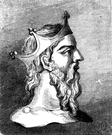Fred·er·ick I
(frĕd′rĭk, -ər-ĭk) Known as Frederick Bar·ba·ros·sa (bär′bə-rŏs′ə, -rôs′ə) 1123?-1190. Holy Roman emperor (1152-1190). After quelling the rebellious German nobility, he attempted to establish his authority in Italy but was forced to concede the sovereignty of the Papal States (1177). He drowned while leading the Third Crusade.
American Heritage® Dictionary of the English Language, Fifth Edition. Copyright © 2016 by Houghton Mifflin Harcourt Publishing Company. Published by Houghton Mifflin Harcourt Publishing Company. All rights reserved.
Frederick I
(ˈfrɛdrɪk)n
1. (Biography) See Frederick Barbarossa
2. (Biography) 1657–1713, first king of Prussia (1701–13); son of Frederick William
Collins English Dictionary – Complete and Unabridged, 12th Edition 2014 © HarperCollins Publishers 1991, 1994, 1998, 2000, 2003, 2006, 2007, 2009, 2011, 2014
ThesaurusAntonymsRelated WordsSynonymsLegend:
| Noun | 1. |  Frederick I - son of Frederick William who in 1701 became the first king of Prussia (1657-1713) Frederick I - son of Frederick William who in 1701 became the first king of Prussia (1657-1713)Hohenzollern - a German noble family that ruled Brandenburg and Prussia |
| 2. |  Frederick I - Holy Roman Emperor from 1152 to 1190; conceded supremacy to the pope; drowned leading the Third Crusade (1123-1190) Frederick I - Holy Roman Emperor from 1152 to 1190; conceded supremacy to the pope; drowned leading the Third Crusade (1123-1190) |
Based on WordNet 3.0, Farlex clipart collection. © 2003-2012 Princeton University, Farlex Inc.